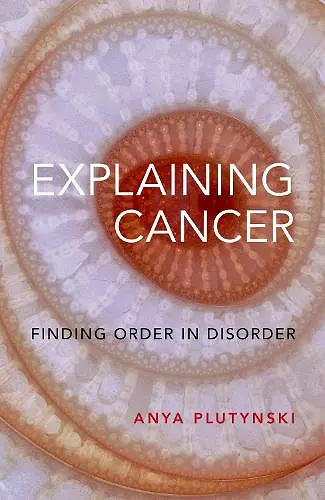Explaining Cancer
Finding Order in Disorder
Format:Paperback
Publisher:Oxford University Press Inc
Published:4th Jul '22
Currently unavailable, currently targeted to be due back around 30th April 2025, but could change

In Explaining Cancer, Anya Plutynski addresses a variety of philosophical questions that arise in the context of cancer science and medicine. She begins with the following concerns: · How do scientists classify cancer? Do these classifications reflect nature's "joints"? · How do cancer scientists identify and classify early stage cancers? · What does it mean to say that cancer is a "genetic" disease? What role do genes play in "mechanisms for" cancer? · What are the most important environmental causes of cancer, and how do epidemiologists investigate these causes? · How exactly has our evolutionary history made us vulnerable to cancer? Explaining Cancer uses these questions as an entrée into a family of philosophical debates. It uses case studies of scientific practice to reframe philosophical debates about natural classification in science and medicine, the problem of drawing the line between disease and health, mechanistic reasoning in science, pragmatics and evidence, the roles of models and modeling in science, and the nature of scientific explanation.
A superb contribution to the burgeoning literature in philosophy of medicine. * Daniel Hausman, author of Valuing Health: Well-Being, Freedom, and Suffering *
Cancer biology is a fascinatingly complex field, and Plutynski communicates this complexity well, illustrating in detail many themes of contemporary philosophy of biology….Overall, I found this a fascinating and helpful book, richly detailed and accessible. * Miriam Solomon, author of Making Medical Knowledge *
Sets the stage for future discussions of the distinctive philosophical implications of cancer research. * Sara Green, editor of Philosophy of Systems Biology: Perspectives from Scientists and Philosophers *
a fascinating story of cancer research ... Anya Plutynski shows how looking at cancer from the philosophical angle can help shape our perception of what cancer is and how cancer biology and epidemiology work ... think the vast majority of readers will find the narrative gripping and will enjoy reading it. Indeed, if philosophy of medicine is a branch of philosophy, the philosophy of oncology is now a new twig that I will enjoy watching grow. * Olaf Dammann, Metascience *
...for those who care about philosophy of science, the book illustrates how cancer can be a rich case study. In addition, the systematic investigation of traditional philosophical debates applied to cancer that Plutynski pursues in this book makes it a great resource for teaching. For those who care about cancer, the book illustrates the need to develop more 'bottom up' philosophical approaches. * Lucie Laplane, History and Philosophy of the Life Sciences *
ISBN: 9780197642504
Dimensions: 239mm x 155mm x 17mm
Weight: 413g
278 pages